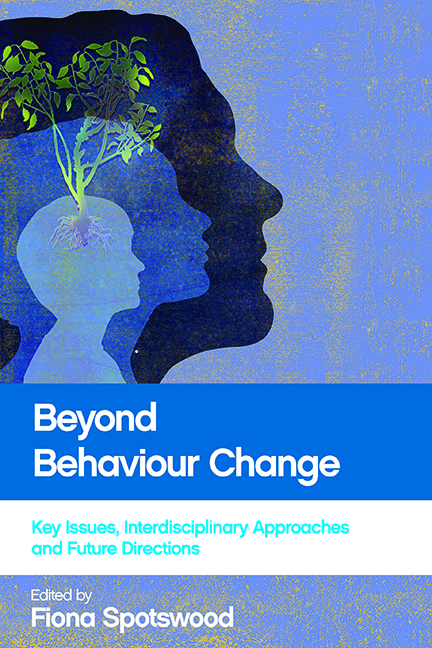thirteen - The emergence of systems thinking in behaviour change: a public health focus
Published online by Cambridge University Press: 01 September 2022
Summary
Introduction
This chapter picks up the thread of ‘multidisciplinarity’ that has been running throughout this volume. This time, the focus is on the growing interest among public health practitioners and academics about the relevance of ‘whole systems approaches’ to a number of current behaviour change challenges. This interest comes in recognition of the wide range of social, economic, environmental, psychological, behavioural and biological factors that influence some of the societal problems we face, particularly in health. However, the translation of concepts, approaches and methods from the extensive literature on ‘systems thinking’ to mainstream research and practice of public health in England is still patchy, even though many of the ideas and concepts have a long history. The term ‘whole systems approach’ is used inconsistently; for example, it can refer to a ‘system-wide’ approach that acknowledges the wide range of factors influencing the health of an individual, community or population but addresses the identified factors with an essentially reductionist, mechanistic approach. The term ‘whole systems approach’ can also refer to an approach that uses a radically different methodology that is informed by the emerging understanding of complex, adaptive systems. This chapter focuses on the latter, exploring the academic heritage of systems thinking before applying the approach to the problem of obesity and drawing on the Foresight obesity study to illustrate the case.
Key features of ‘systems thinking’
‘Systems thinking’ as currently understood emerged in the early 20th century from a number of disciplines including ecology, anthropology, psychotherapy, cybernetics, quantum physics and management theory, although arguably has deeper roots in, for example, the thinking of Darwin, Goethe and Aristotle (Capra and Luisi, 2014).
There are a number of ways of categorising systems. One classification is that of ‘simple’, ‘complicated’, ‘complex’ and ‘chaotic’ (Plsek, 2003; Rickles et al, 2007). A simple system has very few parts and a complicated system (like a rocket) can have a very large number of parts, but both systems are characterised by linear behaviour, where the behaviour of the system can be understood and predicted by an understanding of the parts and the rules governing the relationships between the parts or between inputs and outputs.
- Type
- Chapter
- Information
- Beyond Behaviour ChangeKey Issues, Interdisciplinary Approaches and Future Directions, pp. 257 - 282Publisher: Bristol University PressPrint publication year: 2016



